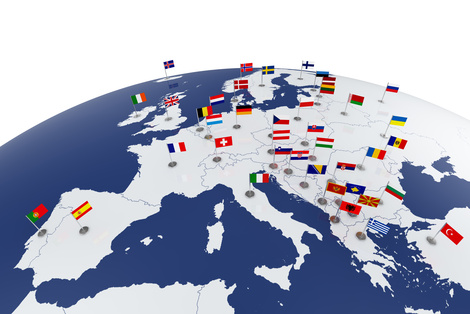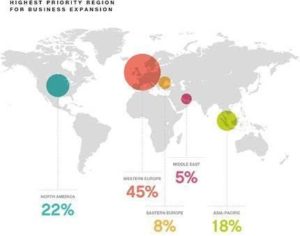Two in three growing businesses are still not exporting abroad, according to Royal Mail research. For 26 per cent of these businesses, the cost and complexity of getting through customs is the main obstacle to exporting.
However according to Royal Mail’s International Delivery Matters reports many international orders from outside the EU, fall below the minimum threshold for which customs duties are chargeable, making those markets more accessible.
Meanwhile, among the 40 per cent of business who sell internationally, just over a quarter of their sales this Christmas (26 per cent) are expected to come from international orders.
35 per cent of the surveyed businesses believe Europe holds the most potential to generate new sales for their business, followed by North America.
A separate study by Sussex Innovation of a new breed of businesses, the ‘micro-multinationals’, underscores the preference for British companies in breaking into Western Europe first.
These micro-multinationals are SMEs that take advantage of new technological advances in order to expand internationally early in their life cycle.
“The impact micro-multinationals can have on our economy is staggering – SMEs account for about 90 per cent of businesses, with other research indicating that 83 per cent of them cite overseas expansion as their top priority,” Neil Hammerton, CEO and co-founder of Natterbox, who commissioned the report, explained.
In the current economic climate, UK SMEs that are solely reliant on domestic trade may miss out on huge export opportunities. Nearly three in five (58.2 per cent) of small businesses report that the domestic economy is a potential barrier to achieving their growth aspirations this quarter, according to figures from the Federation of Small Business.
More than three-quarters (77 per cent) of respondents to the micro-multinational survey expected international business to grow faster than domestic, with Germany and France ranked in the top three nations targeted for expansion.
While Western Europe is still currently the UK’s biggest trading partner, in the immediate aftermath of the EU referendum the future remains uncertain. If Brexit proves to inhibit UK micro-multinationals from establishing a trading base in their traditional markets, many may be discouraged from international growth at the first hurdle.
North America the second most targeted region overall, according to this study, most likely due to the perceived lack of language barriers.
Asia-Pacific is the next most popular region for multinational expansion plans, showing China, Singapore and Indonesia as promising emerging markets.
Depending on how global trade agreements evolve in the wake of Brexit, we may begin to see UK plc developing stronger ties with these nations in particular.
Technology and exporting
The same piece of research showed that this focus on expansion brings with it a high dependency on infrastructure technology.
For smaller, fast growing businesses, reaching a global audience completely hinges on a robust technological framework that create a virtual presence for them in foreign markets.
The research showed that email, customer relationship management (CRM) tools and telephony were the three most significant technologies to these businesses, surprisingly ahead of social media.
Losing out on digital
UK SMEs could be missing out on international sales by not ‘internationalising’ their digital channels, according to yet another piece of concurrent research by Barclays. The study reveals that from assuming English is understood worldwide to focusing solely on UK sales, businesses are overlooking customers in global markets.
According to Steve Childs, head of international at Barclays Business, a website or Instagram page can be your shop window to the world, delivering growth and bigger market share with minimal costs. “With more consumers shopping online, business owners are missing out on sales if they aren’t using or tailoring their digital platforms and targeting international e-marketplaces to attract customers abroad,” he explained.
“Worse still, by not understanding your target market you could even be putting off customers through unintended translation or currency errors.
Exporting without baggage
Here are three sure-fire ways to help you think globally.
1. One size does not fit all
What works in one market may not work in another, even if language and culture are not barriers. Do your research: make sure you’re up to date on each nation’s regulations, customs controls and code of etiquette. A deep understanding of consumer behaviour and successes and failings of other similar businesses to yours can also be invaluable.
2. Have the right infrastructure in place
For e-Commerce companies, you will need to make sure you are exporting products with the same guarantees of quality and service. Ensure your logistics provider is aware of how to present your international orders – it is also important to understand how long it will take for products to reach each international destination, and ensure this information is passed onto the customers there.
3. Visit as often as you can
No matter how many conference calls you have with your distributors or remote office, face-to-face interactions are crucial for business. Make the effort to travel to your new markets to meet your suppliers, distributors, franchisees or clients. This will strengthen business relationships and give you a better understanding of the motivations and obstacles in the market.







